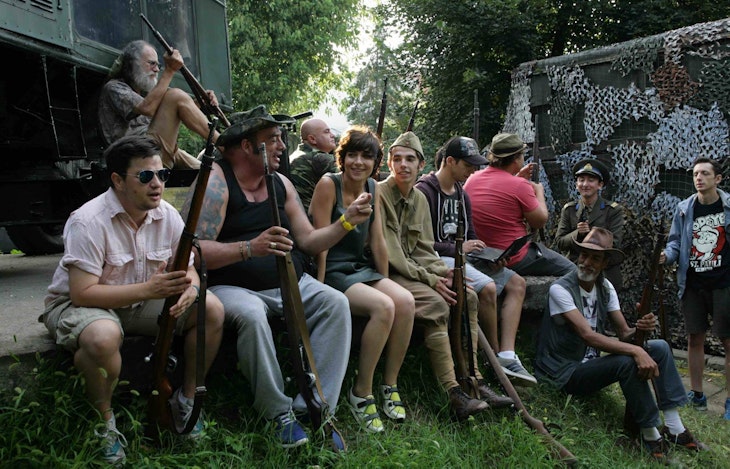- ...
- home
- news
- young critic ...
Young Critic Patrick Preziosi on 'I Do Not Care If We Go Down in History as Barbarians'

However, considering the film’s subject matter — the mounting of a controversial, yet presciently political performance piece — this quote is reappropriated to reflect the attitudes of the headstrong producer, Ioana Iacob (playing herself, though she announces she’ll be portraying Mariana Marin to a camera crew at the start), and her attempt to publicly display the long suppressed historical events that culminated in Romania’s own holocaust, regardless of how it will be received.
“I Do Not Care...” finds Jude pairing a savage sense of humor with an investigation of the unsettling endurance of harmful and apathetic politics
“I Do Not Care...” finds Jude pairing a savage sense of humor with an investigation of the unsettling endurance of harmful and apathetic politics; the production’s ridiculous coming to life is funny, until suddenly, it’s not. It’s backstage drama, where all conversation, no matter how casual, works towards the performance piece’s being, as the cast spends their spare time debating costume choice, and parsing archival footage. Jude explores local sentiment to the threat of censorship on the part of the project’s benefactor, Movila (Alexandru Dabija). It’s exhausting, yet builds its own sense of dense absurdism, subtly paralleling the ever growing regressive social consciousness of recent years.
In her attempt to reveal the ignorance of her audience, she’s revealed just as much about the entire population, as even she is not exempt from being similarly exposed.
There’s a lot at risk for Ioana’s vision: certain players (some nonprofessional, others from a reenactment society) claim discomfort portraying the — what they consider non-factual — killing of Jews in Romania, but don’t mind donning Nazi garbs, just as long as they don’t “have to play a Bolshevik”. In her attempt to reveal the ignorance of her audience, she’s revealed just as much about the entire population, as even she is not exempt from being similarly exposed. In a grossly fascinating exchange, Movila tries to rank global massacres purely on basis of casualties, elevating the likes of the My Lai massacre over this local atrocity, to discourage Ioana. However, she’s perfectly content with people portraying different races or religions, using none other than D.W. Griffith’s 'The Birth of a Nation' (1915) as reference (which the performance then takes its name after).
Rows of firearms displayed in the local museum, a gesture to a former execution site with a lone piece of rope now swinging from it, and the uncomfortably voyeuristic experience of watching someone watch silent footage of an execution on their MacBook Air.
The performance itself acts as the climax, an inventive spectacle of filmmaking (announced by a switch from 16 mm to multiple cameras shooting the event live with digital video), though Jude saves plenty of haunting imagery for relatively quiet moments. Rows of firearms displayed in the local museum, a gesture to a former execution site with a lone piece of rope now swinging from it, and the uncomfortably voyeuristic experience of watching someone watch silent footage of an execution on their MacBook Air.
At this point, “I Do Not Care…” isn’t just some absurdist portrait of our world turned upside down, but a damning portrait of the world as it’s always been.
The performance should be the sobering event Ioana intends for, yet it’s met with cries of support for the Nazis portrayed, and the majority of the audience revels in the same anti-semitism that’s derided. So as the film’s title quote has become reappropriated, its appropriation has now become bastardized, the crowd in fact identifying with the dangerous ideals of the oppressor. At this point, “I Do Not Care…” isn’t just some absurdist portrait of our world turned upside down, but a damning portrait of the world as it’s always been.